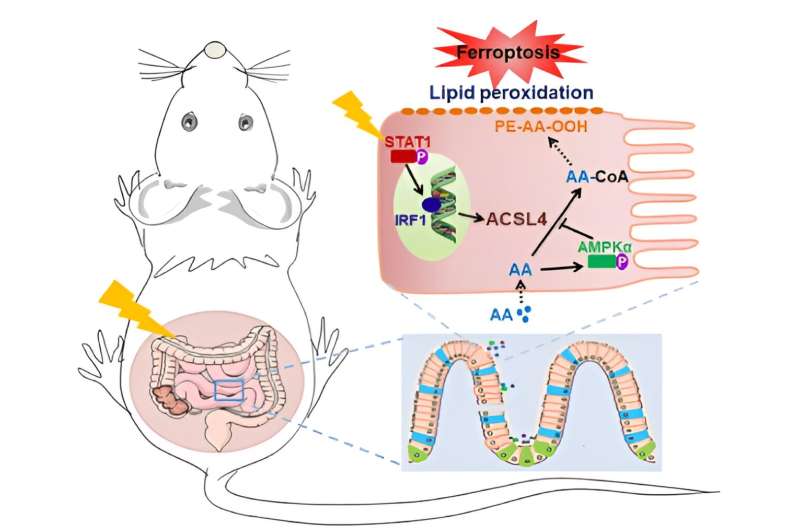This article has been reviewed according to Science X's editorial process and policies. Editors have highlighted the following attributes while ensuring the content's credibility:
fact-checked
trusted source
proofread
Arachidonic acid found to promote the occurrence of radiation-induced intestinal injury

According to research published recently in Redox Biology, a team led by Prof. Han Wei from Hefei Institutes of Physical Science (HFIPS), Chinese Academy of Sciences (CAS) found, for the first time, that dietary arachidonic acid (AA) promotes the occurrence of radiation-induced intestinal injury (RIII).
RIII is a common gastrointestinal complication (incidence rate is about 80%) caused by radiotherapy on pelvic, abdominal, and retroperitoneal tumors. It may lead to the interruption of radiotherapy. At present, no unified and effective methods are available for clinical treatment of RIII. Therefore, determining the pathogenesis of RIII is an important prerequisite for developing the strategies for RIII treatment.
In this study, the team utilized RNA sequencing analysis to investigate the possible involvement of ferroptosis in RIII mice's intestinal tissue. As a result, the levels of lipid peroxidation markers, 4-hydroxynonenal (4-HNE) and malondialdehyde (MDA), were significantly elevated in these mice.
The researchers also discovered that Ferrostatin-1 (Fer-1), a ferroptosis inhibitor, was successful in mitigating both death and intestinal fibrosis in RIII mice. Furthermore, in cultured intestinal epithelial cells (IECs), organoids and mouse models, researchers found that AA, the omega-6 essential fatty acid, is a key factor in radiation-induced ferroptosis. Exogenous AA triggered radiation-induced ferroptosis.
Subsequent mechanistic studies revealed that the activation of STAT1-IRF1 positively regulated the expression of ACSL4, which promoted the occurrence of ferroptosis after radiation. On the other hand, the AMPK signaling pathway was activated by AA and played a negative regulatory role in radiation-induced ferroptosis.
The above results indicated that the STAT1-IRF1-ACSL4 and AMPK signaling pathways were potential molecular targets for the strategies development of RIII prevention and treatment. Arachidonic acid, an essential dietary fatty acid, was an important risk factor for ferroptosis-mediated RIII. This study also suggested that targeted dietary nutrition control, which was expected to alleviate RIII, should be implemented during radiotherapy.
More information: Peizhong Kong et al, Ferroptosis triggered by STAT1- IRF1-ACSL4 pathway was involved in radiation-induced intestinal injury, Redox Biology (2023). DOI: 10.1016/j.redox.2023.102857




















